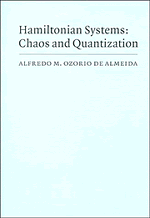8 - Quantization of ergodic systems
Published online by Cambridge University Press: 05 July 2011
Summary
The remarkable self-consistency of the semiclassical theory of integrable systems prevents its natural generalization in the absence of invariant tori. The two ways we may attempt to tackle the problem are by studying the quantization of quasi-integrable systems or, at the other extreme, by plunging straight into ergodic systems. The first option has so far been confined to the quantization of the nearest integrable system that can be found. If the perturbations from integrability are sufficiently weak, this procedure can be justified by the analysis presented in section 9.4.
The present chapter starts with the investigation of the Berry–Voros hypothesis that the classical limit of the Wigner function for an ergodic system is uniform on the energy shell. This leads to some interesting consequences for the smoothed probability density and spatial correlation function. The classical limit of the Wigner function can be refined through multiple iterations of the pure-state condition. In section 8.2 it is shown that the torus Wigner function satisfies the pure-state condition, whereas the energy shell Wigner function is brought into a form that depends on individual orbits. A very important feature is that for an ergodic system we can identify the Wigner caustic with the energy shell itself – the semiclassical Wigner function oscillates inside and decays outside the shell.
- Type
- Chapter
- Information
- Hamiltonian SystemsChaos and Quantization, pp. 181 - 207Publisher: Cambridge University PressPrint publication year: 1989



